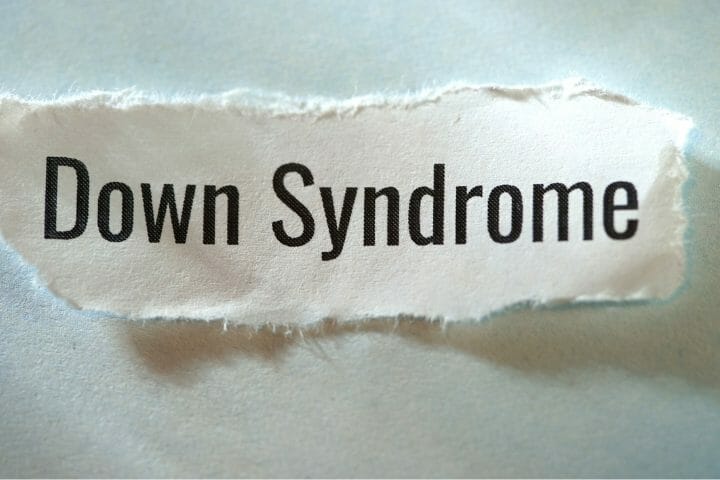Down syndrome and intellectual disability often go hand in hand. But is Down syndrome an intellectual disability? Do all children with Down Syndrome face an ID? What should you do if your child has been diagnosed with an intellectual disability? We tackle these questions.
Contents
The conversation around Down Syndrome and the associated disabilities that come with it has gained attention in the past few years with more research going into it.
It is one of the most common genetic causes of intellectual disabilities among newborns, affecting 1 in every 700 children approximately, as per the Centers of Disease Control (CDC).

Around 15-20% of persons living with intellectual disability are identified with down syndrome. With more information, more people are engaging in understanding the condition and what exactly occurs when a child is diagnosed with Down Syndrome at an early age.
What Is Down Syndrome?
Down syndrome is a chromosomal condition that is associated with intellectual disability, delays in developmental milestones, and physical abnormalities. The cause of Down syndrome is still unknown, but it is believed to be due to a combination of genetic and environmental factors.
People born with Down syndrome have an increased risk of developing certain physical features and medical conditions, such as heart defects, leukemia, and thyroid problems. There is no cure for Down syndrome, but there are treatments and interventions that can help improve the quality of life for people with this condition.
What Causes Down Syndrome?
Down Syndrome is a genetic condition. The main cause of Down Syndrome has been traced back to chromosomal abnormalities that children are born with, wherein an extra genetic material is present in their chromosomes. There are three types of Down syndrome, each with its own set of characteristics: trisomy 21 (the most common), translocation, and mosaicism.
- Trisomy 21, also called nondisjunction, is the most common cause of Down syndrome. It occurs when there is an error in cell division that results in an extra copy of chromosome 21. This extra chromosome results in the characteristics associated with Down syndrome.
- Translocation occurs when part of chromosome 21 breaks off and attaches to another chromosome. This type of Down syndrome is usually inherited from a parent who is a carrier of the translocation.
- Mosaicism is the least common type of Down syndrome and occurs when there is a mix of two types of cells, some with the usual 46 chromosomes and others with 47 chromosomes. The characteristics of Down syndrome will depend on the percentage of cells that contain the extra chromosome.

Screening and diagnosing Down syndrome
Down syndrome is the most common chromosome disorder, and it can be screened for and diagnosed during pregnancy. A blood test called serum integrated screening (SIS) is usually done between the 10th and 13th week of pregnancy to screen for Down syndrome. If the SIS test comes back positive, then a diagnostic test like amniocentesis can be done to confirm the diagnosis.
There are also a number of newer screening tests that are starting to be used, like the first-trimester screening test and the quad screen test. These tests are not as accurate as amniocentesis, but they can give you a general idea if your baby is at risk for Down syndrome.
You might also like to read: Parenting a Child with Intellectual Disability
What is an Intellectual Disability?
An intellectual disability is a cognitive impairment that affects a person’s ability to learn, reason, and make sound decisions. Individuals with an intellectual disability typically have difficulty with daily living skills and struggle to live independently.
Many also experience social and emotional difficulties. Intellectual disabilities can be caused by genetic factors, birth defects, or exposure to toxins during pregnancy. They can also be the result of illness or injury.
Intellectual disabilities can range from mild to severe. There is no cure for an intellectual disability, but early intervention and treatment can improve a person’s quality of life.
Most people with an intellectual disability have an IQ score that falls within the low range. This means that they have difficulty understanding concepts and performing tasks that require basic reasoning skills.
Many people with an intellectual disability also have difficulty with expressive language skills, such as speaking and writing. Individuals with an intellectual disability typically have trouble with social skills.
They may struggle to make friends and participate in activities with their peers. Many people with an intellectual disability also experience emotional difficulties, such as anxiety and depression.

How Are IDDs and Down Syndrome Connected?
There is a strong connection between intellectual disability and Down’s syndrome. Individuals with Down’s syndrome are much more likely to have an intellectual disability than those without the condition.
In fact, around 95% of people with Down’s syndrome have an intellectual disability. This means that they have difficulty learning new things and may struggle with everyday activities such as dressing themselves or brushing their teeth.
Intellectual disability can range from mild to severe, and people with Down’s syndrome tend to fall at the mild to moderate end of the spectrum. However, this does not mean that individuals with mild intellectual disabilities will not face significant challenges in their lives.
Many people with mild intellectual disability will require some level of support throughout their lives, whether that be in the form of special education or support with everyday tasks.
Most people with Down’s syndrome will achieve some level of independence, but some may need lifelong support. It is important to remember that everyone with Down’s syndrome is unique and will reach different milestones at different rates.
You might also like to read: Is ADHD A Learning Disability?
What can I do if I think my child may have an intellectual disability?
As a parent, there are a few things to do if you notice early signs of intellectual disability in your child. These can actually help to determine how your child’s quality of life can be in the long run if you are vigilant about their care and support:
- Talk to your child’s doctor or pediatrician. They can help you determine if your child has an intellectual disability and refer you to resources and specialists if needed.
- Your doctor may recommend physical therapy, language and speech therapy and occupational therapy to help develop the skills needed for a normal life later on.
- Contact your local school district or early intervention program. They can provide information about services and supports that may be available to your child.
- You can contact a local or national organization that provides support and resources for families of children with intellectual disabilities. These organizations can help you connect with other families in similar situations and get the information and support you need.
- Organizational, as well as individual support, is crucial for a child with a diagnosed intellectual disability. It is one of the first steps for them to be part of society and lead normal lives as they are growing up.
- Once they step into education, the social interaction phase begins and with early support, it is possible that they will be able to function like any other children with whom they will be interacting.

Frequently Asked Questions
What type of disability is Down syndrome considered?
Down syndrome is a chromosomal disorder. It is considered in the category of developmental and intellectual disability.
Does everyone with Down syndrome have an intellectual disability?
No, not everyone with Down syndrome has a cognitive impairment. In fact, many people with Down syndrome have above-average intelligence.
However, intellectual disability is more common in people with Down syndrome than in the general population. It is estimated that about 50% of people with Down syndrome have an intellectual disability.
What are examples of intellectual disabilities?
Autism Spectrum disorder, Cerebral palsy, ADHD, Developmental Hearing Loss, and Fetal Alcohol Spectrum Disorder are some of the common examples of intellectual disabilities.
How does Down syndrome affect you intellectually?
Down syndrome can cause a range of developmental delays, from mild to severe. Many people with Down syndrome have an IQ in the mildly-to-moderately delayed range, which means they may have some trouble learning new things and retaining information.
Final Words
Parents and caregivers have to remember that the conversation about intellectual disabilities can be the best way to give their children the support that they need.
It is important to remember that even if there is no known cure for the disorders discussed in this article, it is always possible to improve their quality of life by extending the right care and support from an early stage of life.
Thank you for reading this piece and join the conversation on intellectual disabilities to give everyone a chance at a good and happy life!
